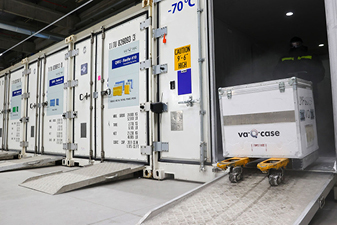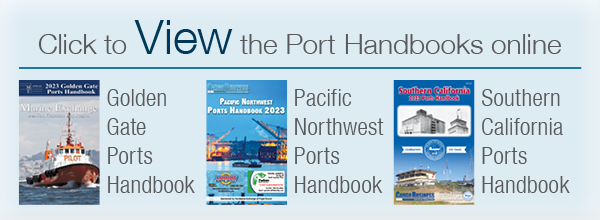|
By Cecile Entleitner, Associate, Blakey & Agnew
The final weeks of December will certainly look a little different in Washington, DC this year. Whereas end-of-year schedules of the past were packed with holiday merriment making, this year's will be all business. However, some things never change: Congress and federal agencies still have much work to do before we ring in the new year. As 2020 comes to an end, lawmakers and Administration officials are working to wrap up the annual appropriations process, prepare for the widespread distribution of COVID-19 vaccines, and hoping to reach an agreement on new pandemic relief funding.
The U.S. Department of Transportation (USDOT) on December 1 announced it had taken all necessary regulatory measures to ensure the safe and efficient distribution of COVID-19 vaccines, both by land and air. Alongside the interagency program tasked with accelerating vaccine development and distribution, known as Operation Warp Speed, USDOT modal administrations coordinated with private sector companies that will transport the vaccines from manufacturing facilities to distribution centers and various vaccination locations. Among other measures, USDOT established safety requirements for vaccine shipments, including standards for dry ice and lithium batteries. The Federal Motor Carrier Safety Administration subsequently extended its emergency order exempting commercial motor vehicle drivers transporting medical equipment, personal protective equipment, and other essential supplies from federal hours of service regulations. The scope of the order was expanded to include the transport of COVID-19 vaccines and will remain in effect until February 28, 2021.
Emphasizing their critical role during the pandemic and their classification as essential workers, several groups have recently urged the Center for Disease Control and Prevention and other government entities to prioritize health and safety resources for the transportation workforce. In separate letters, the American Trucking Associations and the Federal Maritime Commission recommended truck drivers, maritime, and port workers receive prioritized access to the COVID-19 vaccine, rapid testing, and personal protective equipment.
Congress will also examine the logistics of vaccine delivery. On December 10, the Senate Commerce, Science and Transportation Subcommittee on Transportation and Safety convened a hearing to discuss "supply chain issues within the transportation network and ongoing coordination in preparation to distribute the vaccine, as well as the near and long-term outlooks for vaccine distribution." Witnesses included Dr. Rachel Levine, Pennsylvania's Secretary of Health and President of the Association of State and Territorial Health Officers, as well as representatives from FedEx Express and the United Parcel Service.
One of the last unresolved items for Congress this year – although this year is no different from most others – is the annual appropriations package. Unable to finalize a long-term funding bill prior to the start of the 2021 fiscal year, lawmakers passed a continuing resolution in September. This short-term
|

measure extends fiscal year 2020 funding amounts through December 11. Congressional leadership reached a deal on the top-line amounts for each of the 12 appropriations bills in late November and had hoped to vote on the final package before the CR expired. However, complicating negotiations during both the CR's and the 2020 congressional session's final days, was the emergence of a new COVID-19 relief proposal. A bipartisan coalition comprised of Members from both legislative chambers announced a $908 billion COVID aid framework, providing relief provisions through March 2021. Though the final bill text is still in the works, a broad overview of proposed funding amounts was published, including: $160 billion for state, local, and tribal governments; $16 billion for vaccine distribution; and $45 billion for select transportation providers (such as airlines/airports, mass transit, and bus companies). Details of the state and local aid have not yet been finalized, however, a portion of the funding could potentially go toward state departments of transportation.
On December 8, the White House countered the bipartisan proposal—engaging in COVID-19 relief talks for the first time since the November election—with a $916 billion offer of its own. The proposal, presented by Treasury Secretary Steven Mnuchin, includes many of the provisions contained in the bipartisan framework, though it would replace temporary weekly unemployment benefits with another round of one-time direct payments. Democratic leadership called this change "unacceptable" and favored the ongoing negotiations of the $908 billion proposal as "the best hope for a bipartisan solution." Senate Majority Leader Mitch McConnell (R-KY) offered a different approach, suggesting state and local funding as well as liability protections for businesses, schools, and hospitals from pandemic-related lawsuits be removed as a compromise. These issues are among each party's top priorities and have also been the largest sticking points in reaching an agreement.
Both House Speaker Nancy Pelosi (D-CA) and Senate Majority Leader McConnell have stated the appropriations omnibus bill and COVID-19 funding should be incorporated into one package. To allow for additional negotiation time on this package, Congress plans to pass another continuing resolution, extending federal funding through December 18. All eyes will be on that final deadline, as the forthcoming legislation will reveal which issues are resolved and which will carry over into the new year.
Blakey & Agnew, LLC is a public affairs and
communications consulting firm based in
Washington, DC.
|


